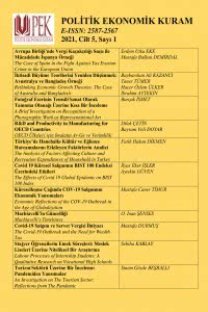Popper Versus Marx: Metodolojik Bir Değerlendirme
Yanlışlamacılık kuramıyla metodolojik ve yöntem-bilimsel tartışmalara damga vuran Karl Popper 20. Yüzyılın en öneli felsefecisi ve sosyal bilimcisidir. Eleştirel akıcılık ve yanlışlamacılık kuramlarıyla modern bilimsel felsefi tartışmalarının ilk başvuru kaynağı olan Popper, düşüncelerini ve teorilerini Aristoteles, Platon, Hegel ve Marx gibi sosyal ve toplumsal anlamda büyük sistem kurucuları üzerinden irdelemiş ve somutlaştırmıştır. Marx’ın geleceğe yönelik öndeyişlerini ve mutlak savlarını eleştiren Popper’a göre ekonomik determinizm temelli bir tarih anlayışı hatalıdır. Çünkü Popper, iktisadi, siyasi ve toplumsal yapıda ortaya çıkan sorunların sadece sınıf çatışmaları ve iktisadi dönüşümler üzerinden değerlendirilmesini hatalı görmüş, hatta bilimsellikten uzak olarak nitelendirmiştir. Buna ek olarak Marx’ın yanlışlamayı ve kuramsal eleştiriyi kabul etmeyen materyalist tarih anlayışı da hatalıdır. Bu durumu tarihsicilik kavramı ile açıklayan Popper’a göre mutlak öndeyişlere dayanan materyalist tarih görüşü, toplum için kesin ve öngörülebilir yargılar taşıması nedeniyle metodolojik olarak yanlıştır. Bu çalışma, tarihsel ve toplumsal bir sistem kurucusu olan ve batı düşüncesini ciddi anlamda etkileyen Marx’ın, ortaya koymuş olduğu iktisadi, siyasi, sosyal ve toplumsal iddiaların Popper özelinde eleştirisi üzerinden oluşturulmuştur. Ayrıca çalışmada, bu eleştirilerin niteliği üzerinde durulmuş ve Marx’ın toplumsal öngörülerinin Poppergil bakış açsısı ile eleştirisi irdelenmiştir.
Anahtar Kelimeler:
Tarihsicilik, Yanlışlamacılık, Yöntembilimsel
Popper Versus Marx: A Methodological Evaluation
Karl Popper, who left his mark on methodological and methodological debates with his falsification theory, is the most prominent philosopher and social scientist of the 20th century. Popper, who is the first source of reference for modern scientific philosophical discussions with his theories of critical fluency and falsification, analyzed and embodied his thoughts and theories through the great social and social system founders such as Aristotle, Plato, Hegel and Marx. According to Popper, who criticizes Marx's predictions and absolute claims about the future, an understanding of history based on economic determinism is wrong. Because Popper considered the evaluation of the problems arising in the economic, political and social structure only through class conflicts and economic transformations, and even described it as unscientific. In addition, Marx's materialist understanding of history, which does not accept falsification and theoretical criticism, is also wrong. According to Popper, who explains this situation with the concept of historicism, the materialist view of history based on absolute predicates is methodologically wrong because it carries definite and predictable judgments for society. In this study, Popper's critique of the historical and social processes put forward by Marx, who is a historical and social system builder and who seriously influenced western thought, and the nature of these criticisms are emphasized and the criticism of Marx's social predictions from Poppergil's point of view is examined.
Keywords:
: Historicism, Falsificationism, Methodological,
___
- Alsancak, E. (2015). Karl R. Popper'in Tarihsicilik Eleştirisi Ve Tarihsici Toplum Örnekleri. Yüksek Lisans Tezi. Sivas : Cumhuriyet Üniversitesi Sosyal Bilimler Enstitüsü Felsefe Ve Din Bilimleri Ana Bilim Dalı Felsefe Tarihi Bilim Dalı.
- Ateeq, M. (2019). The Absolutism Of Marx And Its Consequences: Focus On Karl Popper’s Critique Of Marx. Journal Of Social Sciences And Humanities, 58(1), 43-55.
- Balibar, E. (2007). The Philosophy Of Marx. (C. Turner, Çev.) London: Verso Books.
- Yayın Aralığı: Yılda 4 Sayı
- Başlangıç: 2017
- Yayıncı: Ahmet Arif EREN
Sayıdaki Diğer Makaleler
Zeki DOĞAN, Mohammad Haj HAMİDOW
Türkiye’de Ekonomi İçerikli Protestolar ve “Geçinemiyoruz” Eylemleri
Türkiye’de Sektörel Kredi Yoğunlaşması Ve Büyüme İlişkisinin VAR Analizi İle İncelenmesi
Popper Versus Marx: Metodolojik Bir Değerlendirme
Geçiş Ekonomilerinde Dış Yardımların Ekonomik Büyüme İle İlişkisinin Ampirik Analizi
Ahmet KAHİLOĞULLARI, İrem ERASA AKÇA
Turizm Sektörünün Çevresel Kuznets Eğrisi Açısından Değerlendirilmesi: Türkiye Örneği
Meryem SAMIRKAŞ KOMŞU, Aslı TANER, Mustafa Can SAMIRKAŞ
China's Health Diplomacy Activities During the Covid-19 Pandemic
